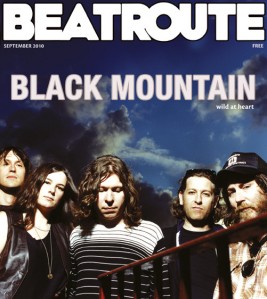This originally appeared in Beatroute Magazine as a Vancouver cover feature. This was the second one I did for the magazine and it was a blast to do. Matt Camirand is a pretty cool dude, and the record is awesome. I couldn’t write “Let Spirits Ride is the best Iron Maiden song Iron Maiden wasn’t talented enough to write”, but I think the sentiment punches through.
It’s always roots versus ambition. Staying in one spot offers comfort and clarity, but can keep you mired, stuck. Ruts form. Ambition is the other side of the same coin, a scarier prospect where the risks and rewards are greater, if harder to attain. Black Mountain knows the ebb and flow of roots and ambition. The Vancouver rock outfit pays obvious homage to their roots, their sound anchored with a solid base coat of their rock god idols. But they, like fellow West Coast rockers Comets On Fire, similarly figured out what bands like Wolfmother and Jet can’t seem to grasp: that the base coat is just that; a little ambition is needed for the details. It’s appropriate then that bassist Matt Camirand and Black Mountain left home and roots behind and took the recording of their latest, Wilderness Heart, deep into Axl Rose’s “jungle.â€
“In L.A., it was pretty heavy because we were recording at Sunset Sound Studios, and we had recorded there just to do one song previously. Doing a whole record there was pretty inspiring because the studio has been home to countless numbers of artists that all of us totally admire and worship,†Camirand says. The studio that would give shelter in part to the fugitive Rolling Stones for Exile on Main Street played host to Black Mountain, a band with deep roots in the lower mainland. Famous for members’ work in the downtown east side and the much overblown “Black Mountain Army,†their group of associated artists and acts, the trip down the coast to record was a significant venture. “Neil Young has recorded there and Fleetwood Mac recorded there. Innumerable artists have been there. The thing about it is that they haven’t changed the place very much since those days in the ‘70s and ‘60s.†The same wood paneling and equipment that gave birth to the sound Black Mountain makes sport out of improving upon was a good fit for the band. “The album was almost like recording at home.â€
After the quiet roar induced by their eponymous debut and the tidal waves created by breakout LP In The Future, Camirand and bandmates Stephen McBean, Jeremy Schmidt, Amber Webber and Joshua Wells had more than a few big names interested in working with them. In part, they traveled to Los Angeles because “Dave Sardy had expressed pretty strong interest in producing the album.†D.Sardy (of LCD Soundsystem fame) and Randall Dunn (Kinski, Sun O)))) both took up production duties on the album. “Dave prefers to work at his home studio in L.A. and Sunset. He also has access to a shit-ton of old vintage equipment that are in miraculous condition.†The band has said in the past that they see production as another step in the creative process, but Camirand believes that learning to let go is a calculated risk. “That was stressful and it’s scary, but it’s exciting and we knew it would be like that.†Wilderness Heart represented a shift in philosophy with the recruiting of Sardy. “It was like, okay, let’s bring somebody in and shake shit up from the beginning. It’s something I’ve always wanted to do, work with a producer, but never was able to afford to do it. It was a pretty big change but it was the only way to get good results half the time, is to take risks.†The result was a record that is unmistakably the product of strict creative control on the part of the band, but with the guidance of differently able hands. If In The Future was a hulking tool of heavy industry, Wilderness Heart is surely a precision timepiece; no less complicated, but cleaner and exacting.
The pressures of success can cause friction even in a group as practiced as Black Mountain. This pressure built ahead of the first attempt at recording In The Future, and caused a much-publicized hiatus that saw much of the original material scrapped in favour of new tracks. It’s a situation Camirand thinks they’ve overcome. “We planned ahead a little better, because we knew what was gonna happen. We knew we were gonna take a break just like last time. We kinda just set aside two months before. We went our separate ways to do a bunch of writing. Then we went to a rehearsal space every single day five days a week and spent the afternoon just kinda jamming and getting ideas.†The system they’ve created for themselves is one that Camirand believes has eliminated any expiratory date for the band. “I think it might have expired a while ago if we hadn’t figured out so quickly the routine we have for ourselves. I really like it. You can’t be stuck in a van and then a hotel room, then an airplane, then a green room at a venue with the same people over and over again, you know, for a year or two years on end without some kind of fighting. It just can’t happen.†He adds, “There’s five people in the van and it’s like I have four girlfriends.â€
With competing side-projects creating the dynamic at work on Wilderness Heart – Blood Meridian, Lightning Dust and Pink Mountaintops to name a few – it would be no stretch to assume that creative competition causes a similar strain. Camirand is adamant they’re past such squabbling. “I think we’re all old enough now we’ve done this for a while that we realize that a great song, most great songs that you write, don’t include everybody equally, you know? There’s always someone taking the lead. There’s a give and take, like, we’re gonna write this song and maybe there will be no bass. You’re old enough to go, ‘Okay well that’s the best thing for the song’ and it’s not like a personal dig or whatever. You know on some other song you will be prominently displayed.†Despite a fierce inventiveness evident on a spin, the critical discourse on the band has been one of base lumping into genres, a chorus of “stoner rock†and “psych-rock†qualifications that fall painfully short. Camirand is unfazed, saying his “first instinct is to consider the people a little narrow minded.†He recognizes the nature of the beast, however. “It doesn’t really have anything to do with me. It’s not meant for me, those kind of comments.†As much as it is not tailored for him, Camirand cannot ignore the press. The deluge began far before the release of In The Future, but reached a critical mass after a track was included on the soundtrack for Sam Raimi’s Spider-Man 3. Ahead of Wilderness Heart, he’s started reading the band’s mounting press all over again. “I’m as excited as anyone to see if people like it.â€
As a seeming result of stepping out of their comfort zone, Wilderness Heart is an evolution in the sound Black Mountain has harvested from their predecessors and cultivated into something unique. “It’s certainly the biggest leap we’ve taken in terms of songwriting and production and stuff,†says Camirand. Opening with the southern folk licks of “The Hair Song†and falling into a compelling groove with the brooding “Rollercoaster†and the insistent and powerful title track “Wilderness Heart,†the record sounds more vital and punchy than previous output. Its focused delivery omits any analog to the problematic (if unduly maligned) In The Future epic “Bright Lights.†Mid-album standout “Let Spirits Ride†is a dynamite piece of prog metal that should have Iron Maiden nervous. “That one almost didn’t make the record,†Camirand says. “It grew on me. It wasn’t my favourite track when we were recording but when we were mixing, it kinda jumped out and took on a new level.â€
With the formula for band success working in his favour and time spent working with residents of the downtown east side, Matt Camirand is striking the proper balance between roots and ambition, and it shows on Wilderness Heart. “It’s really important for me, aside from the other bands, to step back from Black Mountain and go back to work in the mental health care industry. I like going back to the residents I’m working with who are all acid casualties from the ‘60s and are super stoked on Black Mountain. And you know that gets exhausting and irritating too and then it’s time to go back on the road again.
“I’m really lucky to have that opportunity to keep refreshing myself.â€
Comments Off on Feature – Black Mountain

